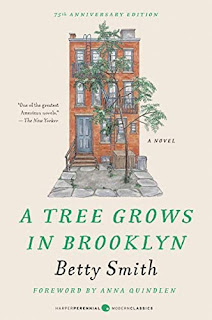Betty Smith was born in Brooklyn, New York, in 1896, the daughter of German immigrants, and grew up in the borough's Williamsburg section. In addition to A Tree Grows in Brooklyn, Betty Smith's novels include Tomorrow Will Be Better (1947), Maggie-Now (1958), and Joy in the Morning (1963). She also had a long career as a dramatist, during which she received both the Rockefeller Fellowship and the Dramatists Guild Fellowship. She died in 1972. You can find more of my reviews of books from TIME's Best YA Books of All Time here.
From the moment she entered the world, Francie Nolan needed to be made of stern stuff, for the often harsh life of Williamsburg demanded fortitude precocity, and strength of spirit. Often scorned by neighbors for her family's erratic and eccentric behavior—such as her father Johnny's taste for alcohol and Aunt Sissy's habit of marrying serially without the formality of divorce—no one, least of all Francie, could say that the Nolan's life lacked drama. By turns overwhelming, sublime, heartbreaking, and uplifting, the Nolans' daily experiences are tenderly threaded with family connectedness and raw with honesty. Betty Smith has, in the pages of A Tree Grows in Brooklyn, captured the joys of humble Williamsburg life—from "junk day" on Saturdays, when the children of Francie's neighborhood traded their weekly take for pennies, to the special excitement of holidays, bringing cause for celebration and revelry. Betty Smith has artfully caught this sense of exciting life in a novel of childhood, replete with incredibly rich moments of universal experiments—a truly remarkable achievement for any writer.
Francie's story is one of the best that I've read in a long time, and it's clear to me why it's such a classic. However, like Anna Quindlen points out in her introduction, it's a book that's hard to summarize in a few words. Its plot is difficult to distill. The only true way to discuss A Tree Grows in Brooklyn is to discuss it while reading it. While I was reading it, I found myself wishing this was a book that I'd read in school, where I could talk about some of the language, the moments, the scenes with my peers. Because of this, I think it makes A Tree Grows in Brooklyn a great candidate for a classroom, or a book club, or some other equivalent. The story is so rich, and the book itself demands to be read slowly and digested. There is so much to discuss and celebrate and dig into between these pages.
I loved how A Tree Grows in Brooklyn felt like a true slice of life. It's a coming-of-age story to be sure; readers follow Francie through time as she grows up, sometimes through her own eyes, and other times through the eyes of the omniscient narrator or other characters. Francie's story is grounded in details—how her family makes strong cups of coffee, how she scrounges for pennies based on junk she turns in for cash, and the tree that grows in Brooklyn. As she grows up, those details don't leave her, but take shape within her character. It's difficult for readers to forget those details, and it feels like we grow up alongside Francie, as we learn different ways of viewing those same details. Like I mention above, it's difficult to describe, and truly something you have to experience through reading the book itself. But it's absolutely worth the time, and the read.
Betty Smith was born five years before Francie, and grew up in the exact same town she builds in this novel, so there's a true sense of knowledge behind the entire story. Smith rebuilds her slice of Brooklyn in startling detail, and does not sugarcoat a single thing. Part of the reason it takes so long to read the story is because no detail is spared, and you have to really digest all of it to feel part of Francie's journey, which includes all the bumps in the road. It is an emotional read, and I believe that is because Betty Smith was perfectly poised to write this story; no one else could have. Smith does not pull any punches in the depiction of Francie's life and emotions, making for such a portrait of one girl's life, and how it wasn't just one girl's life, but the lives of many in Brooklyn at this time.
A brilliant read, I believe that everyone should read A Tree Grows in Brooklyn at some point in their life. I'm so glad that I had the chance to, and can't wait to recommend it at every turn. You can find more of my reviews of books from TIME's Best YA Books of All Time here.
*This review can also be found on my Goodreads page*

Comments
Post a Comment